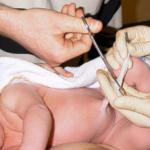There is little as fascinating as maternal-fetal physiology, given that pregnancy itself is the most well-designed suspension system in the world. Add to this complexity the dynamic nature of birth.
pediatrics
Prior to the birth of baby Archie to the Duchess of Sussex Meghan and her husband Prince Harry, there was much media speculation that they were opting for a home birth instead of a hospital one.
The National Center for Health Statistics released their report of provisional 2018 data on U.S.
In a piece published today in the journal Science Translational Medicine, researchers present a proof-of-concept study maintaining they designed “an accessible solution that uses speakers and microphones within existing smartphones to det
For royal fans everywhere, great joy was delivered as news circled the globe Prince Harry and Duchess Meghan's baby boy was born.
A new study in Translational Psychiatry sought to elucidate whether reduced telomere length (TL) is associated with childhood trauma in those with schizophrenia (SZ) and bipo
The college admissions scandal that is saturating the airwaves involves more than abuse of the educational system.
A new study presented by co-author Eyal Sheiner, MD, PhD, chair of the Obstetrics and Gynecology Department at Soroka University Medical Center, Be'er-Sheva, Isr
Expectant parents are bombarded from all directions about what they should or should not worry about before the baby is even born - not that this ever stops after delivery.
A study on maternal health in Risk Analysis found hospital delivery complications to be highest on night shifts, weekends and holidays when compared to daytime, weekday










